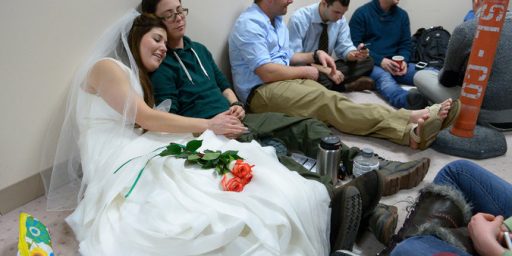LEGAL QUERY
Andrew Sullivan makes a claim that contradicts something I’ve posted on occasionally:
Despite disingenuous attempts to claim otherwise, the Full Faith and Credit Clause has never applied to marriages and still doesn’t.
Do any of you know the case law on this one? While I’ve studied–and even taught–Constitutional law, the Full Faith and Credit Clause is sufficiently obscure that it’s usually omitted from even two-semester undergraduate sequences.






This contradicts my understanding as well. I recall reading a journal article on this a while back. I will see if I can find it. My reaction is that Sully is wrong, but have nothing off the tip of my brain to prove it.
OK. Those famous Las Vegas quickie marriages and divorces would seem to be anecdotal evidence, if nothing else.
Yeah, I was thinking about Las Vegas too.
Also, isn’t it illegal in some states for first cousins to marry but not in others? But don’t all states recognize first cousin marriages as long as they were legally performed?
Then again, surely Google can help. First this:
“A note: the states (in the USA) which currently prohibit first cousin marriage are: AZ, AR, DE, ID, IL, IN, IA, KS, KY, LA, ME, MI, MN, MS, MO, MT, NE, NV, NH, ND, OH, OK, OR, PA, SD, UT, WA, WV, WI, AND WY….One more note: In January of 1887 my great-great grandmother, Mary Elizabeth Sheets Herman, and her first cousin and beau, William H. Miller, both of Philadelphia, PA, took a ferry across the Delaware River to the city of Camden, NJ, in which state they could legally become married. They returned to Philadelphia where they lived, worked, and raised five children, besides Mary’s two children still living from her first marriage. That marriage was recognized as legal in PA, even if it was not legal to become so married in that state. They and their children lived well.”
On the other hand, Kentucky specifically doesn’t recognize cousin marriages even if performed in another state. My guess is that this is never enforced (how would you know?), but it’s still the law.
Marriage is, specifically, one of the things that the full faith and credit clause was intended to address, according to the debates in the Constitutional Convention.
I think Andrew’s being too clever by half.
Andrew is wrong in the general sense, but right in the gay-marriage specific. Read the whole “full faith and credit” section.
“Section 1. Full faith and credit shall be given in each state to the public acts, records, and judicial proceedings of every other state. And the Congress may by general laws prescribe the manner in which such acts, records, and proceedings shall be proved, and the effect thereof.”
So Congress can — by appropriate legislation — decide that one a particular topic a state need not give any “effect” to a marriage performed in another state.
The Defense of Marriage Act did that. A properly enacted Defense of Consanguinity Act could do the same for first cousins, but that law hasn’t passed yet.
It should really be called the “full faith and credit absent Congressional intervention” clause.
pathos,
I noted the second clause in my original post, but the plain language often doesn’t mean much in terms of how it will be interpreted. If that were the case, states would still control abortion and, indeed, Marbury v. Madison would never have happened.
—